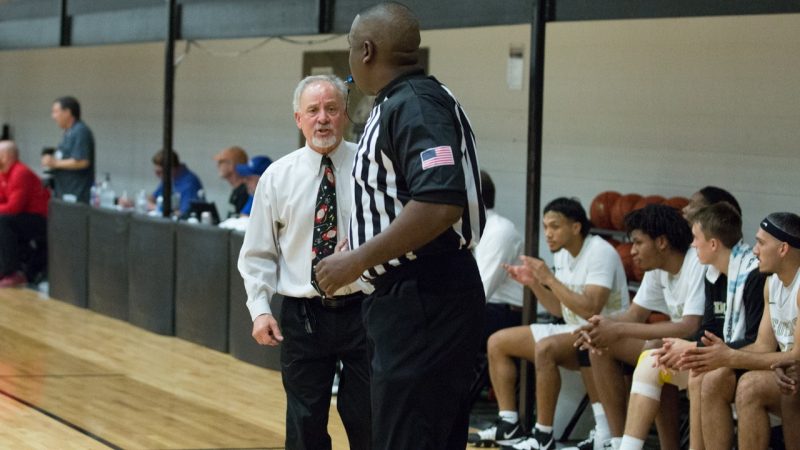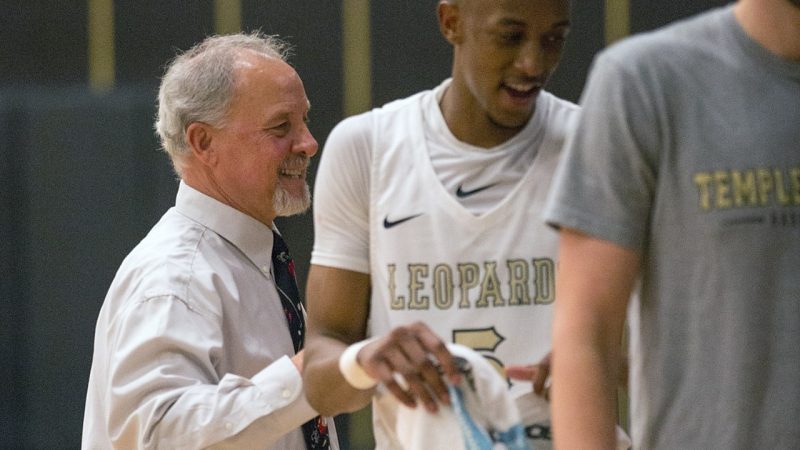EDITOR’S NOTE: Riley Zayas is a high school freshman and freelance journalist from Round Rock, Texas. His work has appeared in Sports Illustrated for Kids, Horns Illustrated, Fellowship of Christian Athletes publications and his personal blog, 360 Sports.
Forty-three years ago, a young man from Temple, Texas, set out on a journey.
He wouldn’t be doing it for fame, he wouldn’t be doing it for fortune, he’d be doing it because it was his passion and calling.
>> Subscribe to Sports Spectrum Magazine for more stories where sports and faith connect <<
To this day, that passion still burns inside him as he’s ascended the ranks and worked hard to be the best he can be, in his career, as a father and as a husband. He’s a living example of how we should all be as Christians, following God’s plan and leaving a lasting positive impact on those he interacts with every day. The basketball court is his mission field and his name is Kirby Johnson.
As a high schooler, Johnson already had the mentality of a coach. Every time the young guard was on the court, he remembers thinking about things from a coaching mindset, asking himself, “If I were the coach, would I have my players do this?” Of course, he points out, that was a time when you didn’t dare call out your coach or act like you knew better than he did. However, Johnson was already training for what God had in store for his future, and that thought process was the first step.
“I was intrigued with the idea that, ‘If this was my team, could we be successful?,’” Johnson remembers. “So the more that I got into basketball, the more that intrigued me. Where when I was a senior in high school, I was kind of analyzing what my coach was doing and thinking, ‘Is this what I would do?’ That’s kind of how I got into coaching, I was just intrigued as a youth.”
Looking back, he says his time as a high school player really laid the foundation for his extensive coaching philosophy years later. One of these experiences was running “Horses.” In this long and energy-draining conditioning drill, players would sprint back and forth several times at the end of every practice. What he began to find, though, was that this didn’t really make the team’s practice more beneficial; it actually took away from it. Players would save energy by not going as hard in practice, so they could run the horses at the end.
“I was sitting there thinking, almost everybody saved energy during practice for the end of practice so they could run them at the end. I always thought, ‘That’s stupid.’ Because everybody didn’t go as hard in practice,” he said.
From that point on, he decided he’d never have his players do straight-up running during regular-season practices. So now as a college coach, once the season begins, his team doesn’t do a whole lot of conditioning, but instead incorporates the running into drills, which accomplishes two tasks at one time. The players improve their stamina while working on basketball as well. This small aspect of his extensive philosophy is one of the things that has led to the success of his teams at Temple College. As is the case with most coaches though, he didn’t start out leading teams to national scoring championships. In fact, the final goal of the first team he coached was to score at least once a game.

Temple College head coach Kirby Johnson (Photo courtesy of Temple College)
Right place, right time
After high school, Johnson went to Texas Tech University, expecting to graduate four years later with a degree in business. However, as he puts it, “God’s plan is better than our own.” Midway through, he switched his major to education, changing his career path from businessman to coach. When he finally graduated, he immediately picked up his first coaching job with the 7th grade B team at Smiley Wilson Junior High in Lubbock, Texas. His team had three goals that season.
“Our first goal was to get the ball past midcourt,” he remembers. “That took a while. Then we tried to get the ball past half court and actually get off a shot. That took a while. By the end of the year, our goal was to get the ball past midcout, get off a shot and actually make one. I don’t know many points we averaged, but it wasn’t many!”
Interestingly, he got the opportunity to move up the ladder with nearly the same group of kids for the next three seasons. Following that first year, he earned the 8th grade A team job, then coached the 9th grade A team the season after that. From there, he moved to the city he’s called home since 1980, Temple, Texas. That’s when he secured the head job with the Temple High JV team. He says he was in the “right place at the right time,” and was given the varsity job just a season later when the head coach left for another school.
Just a couple of years further down the road, he moved up to the next level — college — when he took the position as head coach of Temple College, a junior college team, right down the road. With a chuckle, he points out that he was promoted twice, coached three different teams, and never had to move.
“That was obviously God’s plan,” he said. “My wife is not a sports person, so her idea of coaches were that they moved around all the time, which is true in most cases. When we were dating, she told me she didn’t want to move around all the time. So I said, ‘If we find somewhere we like, we’ll stay.’”
Temple proved to be that place.
From the time Johnson took over the Leopard basketball program in 1987, he’s worked tirelessly to turn this small school into one of the most consistent JUCO basketball programs in the state of Texas. Thanks to their pressing defense, ability to score quickly, and fast-paced transition game, Temple has won 12 national scoring titles, meaning they scored the most points of any team in JUCO basketball that season. In fact, one of the first things you’ll notice if you walk into his office are dozens of newspaper clippings, each highlighting a different game in which the Leopards scored over 100 points. Their current record: 176 points in a single game! It might seem unbelievable, but the fact that they’ve averaged 100 points a game for 1,000 games is even crazier. While stats and numbers like these reveal the consistency of high scoring for Temple teams, there’s been one constant throughout the years — Coach Johnson.
For a coach to stay with one team for more than four decades is almost unheard of in the world of college hoops, where every season, nearly 15 percent of teams have a new head coach. Yes, he’s had chances and opportunities to ascend to the NCAA Division I level as an assistant, but Temple has always been perfect for him as a coach, father and Christ-follower.
Merging faith and basketball
One of the biggest reasons he’s stayed at Temple is because no one at the school has ever questioned his integration of faith into basketball. A man whose faith is evident in every area of his life, he leads his team in a prayer before every game, and coaches from a Christian worldview.
He’s also implemented a unique annual tradition for the team. One Sunday each fall, Johnson and his wife, Kim, invite the entire team to their church, a life-changing experience in multiple cases. He still remembers one player in particular, extremely nervous about the whole thing. He continuously was asking Johnson what they were going to do, how they were going to do it, and was he going to be asked to do anything. That’s when Johnson realized the player had never, in all 18 years of his life, stepped foot inside a church.
For guys like this and many more, this one church service is so beneficial, especially because if they didn’t come to Temple, they might not ever hear the Gospel. In addition, the majority of players in his program grew up without fathers, so while he doesn’t try to be their dad, he tries to act as a father figure for these young men, always being there if they need to talk to someone or just have questions about basketball, faith, life and everything in between.
The same goes for his assistant coach, James Robson, who Johnson says “is more like a brother to these guys.” The 30-year-old coach follows the lead of Johnson, and together the two have formed a ministry that impacts players far beyond the court.
“All the coaches here are strong Christians,” Johnson says. “It’s not a situation where my guys have to be Christians. But we influence them that way and make it open-ended that if there’s anything they ever want to talk about from a Christian standpoint, we’re here. We want that image of the Christian values and principles when they see us and are a part of our program.”
Another big reason Johnson has stayed in Temple is the excellent job security and freedom as a head coach, versus serving as an assistant. Often times, when a head coach gets fired, so does his entire coaching staff, leaving the assistants to search out new jobs, which almost always require another move. Incredibly, when Johnson retires at the end of this season, he’ll have been a coach for more than four decades and never gotten fired. In addition, he’s been able to run the program the way he thinks it should be run, not someone else.
Finally, it goes back to his dedication to faith and family. At Temple, and as a head coach, he was able to create their practice schedule to where he hardly ever missed one of his sons’ baseball games, and got the chance to spend time with his family, since he wasn’t always on the road or at the gym.
“The flexibility and ability to spend time with my family is what’s kept me here,” he said. “That’s a lot more important to me than my job. If I had to rank things in order, my faith is first, family second, and job third, or way after that.”
Every coach has a unique spin he puts on his coaching. Johnson has one as well. Every single play the Leopards run is named after his wife, sons, daughters, their spouses, dogs or his grandchildren. After all, he points out, “You have to name them something.” So, he thought, “Why not after my family?” In fact, players from years before will come back and ask about his kids. They remember their names decades later because of those plays they ran over and over throughout the season.
“Every now and then you’ll have an ex-player that comes back and asks, ‘How’s Tyler doing?’” Johnson says. “I’ll be like, ‘He’s doing good. I can’t believe you remember their names!’ And he’s like, ‘Coach, those were our plays, and I still remember those plays were the names of your kids.’”

Temple College head coach Kirby Johnson (Photo courtesy of Temple College)
High level of excellence
That winning tradition he’s established has carried over to his team in 2019, the final team he’ll coach in his 43-year coaching career as he plans to retire after the season. Now 18 games into the 2019-20 season, the Leopards just lost their first game on Wednesday, but remain on the verge of being ranked in the NJCAA D-I top 25.
Out of all the teams he’s coached, Johnson sees his current squad as one of his most talented, which says a lot considering all the honors and awards this team has collected. They’re led by Kedrian Johnson, a guard who is committed to play at West Virginia next season, and Carlton Linguard, a 6-foot-11 post player who has interest from Power Five programs such as Baylor, Oregon and Texas A&M.
While some may have a bigger future in basketball than others, Johnson’s team is well-coached and one of their recent games is evidence to prove it. Against DFW Prep, the Leopards were in sync throughout the whole game, racking up 115 points while limiting their opponent to just 58. It was their 12th game of the season in which they scored 100 points or more as they ran their signature fast-paced attack. It was a typical performance by this team that goes for a high level of excellence installed by Johnson.
In his office, a plaque hangs proudly in the corner, bearing the Bible verse Joshua 24:15, which says “But if serving the Lord seems undesirable to you, then choose for yourselves this day whom you will serve … But as for me and my household, we will serve the Lord.” Amongst all the other newspaper clippings, awards and honors from his successful coaching career, that one stands out to him. After all, it’s been his foundation of faith that has remained strong through season after season, job after job, and challenge after challenge.
So as this great junior college coach finishes his final season, he will be remembered by basketball fans as a great coach who always knew how to get the best out of his team. But to his players, assistant coaches and those who interacted with him throughout the years, he’ll be remembered as an even better man whose impact was widespread.
For Kirby Johnson’s coaching career, evangelist Billy Graham’s famous quote applies: “The greatest legacy one can pass on is not money or other material things, but rather a legacy of character and faith.”
Riley Zayas is a high school freshman and freelance journalist from Round Rock, Texas. He began his journalism career as a Sports Illustrated Kid reporter and has since become a regular contributor to Horns Illustrated, covering Texas Longhorn sports. His work also includes Fellowship of Christian Athletes publications, his personal blog 360 Sports, and now Sports Spectrum, having been a longtime fan of the magazine.
RELATED STORIES:
— Western Michigan QB Jon Wassink leaves legacy of serving, stemming from faith in Christ
— D-III football powerhouse University of Mary Hardin-Baylor built on foundation of faith
— Texas guard Andrew Jones scores career-high 20 points in return from leukemia
— Butler coach LaVall Jordan leans on Christ while leading No. 11 Bulldogs to strong start
— Wayland Baptist’s J.J. Culver gives glory to God after record-setting 100-point game



